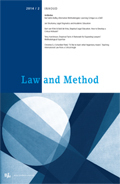|
Many doctrinal legal research questions require making use of other academic disciplines or perspectives. This article explains the relevance of legal philosophy for doctrinal research projects. Often legal research questions have conceptual or evaluative dimensions that presuppose philosophical understanding. For research on the concept of democracy, the function of constitutional rights, or the possible introduction of a referendum in the Netherlands, questions of a philosophical nature need to be answered. Legal philosophy can supplement and enrich doctrinal research in various ways. In this article, we present seven purposes that legal philosophy may serve in the context of a doctrinal research project: conceptual clarification, exposition and reconstruction of fundamental normative principles and values, theory building, providing creative perspectives, structural critiques, evaluation, and recommendations. For each objective, we illustrate how to use relevant philosophical methods. Thus, this article complements our earlier publication ‘Legal Philosophy as an Enrichment of Doctrinal Research – Part I: Introducing Three Philosophical Methods’.1x http://www.lawandmethod.nl/tijdschrift/lawandmethod/2020/01/lawandmethod-D-19-00006. Noten
|


Law and Method
About this journalSubscribe to the email alerts for this journal here to receive notifications when a new issue is at your disposal.
January, 2022
Expand all abstracts
| Article |
|
| Keywords | legal philosophy, research methods, interdisciplinary research, conceptual analysis |
| Authors | Sanne Taekema and Wibren van der Burg |
| AbstractAuthor's information |

 Issue 07
Issue 07